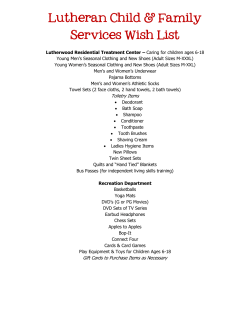
How to get the most of your Sterling Water Softener
Sterling Quality Water LLC www.sterlingqualitywater.com 410-848-1025 (Westminster) 1-877-418-3987 Westminster, MD since 1992 Refined and Pure, “That’s Sterling Quality” Save money from going down the drain! How to get the most of your Sterling Water Softener If this is your first experience using water from a water softener system, you will see a noticeable difference from the past use of hard water. The harder your water was, the bigger the difference will be. Water is called “Hard” because it is harder to work with on everything! “Hard” because it produces rock scale deposits in pipes, water using appliances, and inside hot water heaters. Homeowner experience increasing energy expenses. Premature failure to clogged fixtures, water heaters, icemakers, automatic dishwasher, everything using water becomes damaged resulting in costly repairs or replacement to homeowners. “Hard” on labor time to clean off hard water scum and spots that not only look bad on sinks, counters t, bath tubs, showers walls, and glass that may also harbor harmful bacteria. “Hard” on the body resulting in red itchy and dry skin. Hair becomes damaged and stiff and loses its sheen. “Hard” on fabrics, clothes, linens when washed in hard water can reduce the wear of these items normal lifetime by one third. Hard water often leaves stains and discoloration in fabrics. Minerals and soaps are left within the threads making them stiff and brittle to the touch. “Hard” on your budget, for removal of scale deposit require stronger more costly products to remove their stain. Dishes and glasses require added detergents for spot removal. Fabrics require softening products to fluff up their feel. Stronger cleaning products are needed to clean bathtubs and showers from soap scum left behind from the soaps and dirt inability to be washed away in Hard water. Let’s start and dispel a myth: Detergents do not clean as well as soap. Years ago people used naturally soft rain water to do their wash. They made their own soap. As time went on, soap powders like Fells Naphtha, White King Soap, and Ivory Snow flake become the washing product used in ringer washers. Most ground water has some degree of hardness minerals, it adsorbs soap and will curd, so doing laundry still required the old rain barrel. With the onset of the baby boomer years, folks began to use synthetic petroleum base cleaning products (detergents) inside automatic washing machines. Much more water was needed for cleaning. The use of ground water was necessary to provide that volume. Now with all the modern appliances used today, homeowners need to choose either the use of chemical cleaning products or to improve the water. Detergents do not clean better then soaps…they only appear to. Detergents contain harsh chemicals additives to chemically soften the water and contain fillers to chemically reflect the dominate color of the garment or fabric. Scent is added to make thing smell good. Caustics are added to correct PH and allow any soap product to work and remove soil. Dyes are added that can damage fabrics and irritate the skin…. And they’re expensive. With the increase of cost of facile fuels, petroleum product lines like DuPont have increased their prices greatly in recent years. Harder water requires more fabric softener. (There is less than 15% soap in a box or container of detergent.) Noting cleans better than pure soap and clean soft water. Now that you have improved your water with a Sterling Water Conditioner, you must learn to make some adjustments in your daily cleaning and laundering habits and if you do, you’ll find life a lot easier, you’ll save around $500 a year in the process. In 10 years that’s $5000; no wonder soft water is considered such an excellent Investment!!!! Let’s go through the house and show you how to make things easier while we save you some money. Laundry Initially you will need to clean your washing machine. To begin any process you will need soft water both hot and cold. A newly installed water softener could take two days to replace your hot water heater with conditioned water. This will depend on how quickly you use up your old water in the heater. Pour in a cup of household ammonia and run the machine through its cycle empty. This will eliminate any scum that has built up in the appliance. Next, recondition your clothes by adding ¾ cup Calgon, Do this when you normally add detergent to the load of clothing. Let the washer agitate for 2 minutes. This will break loose any residue in the clothing. You may find that enough detergent is released to wash the clothes without adding any more detergent. If necessary, add some detergent sparingly until you get ½ to ¾” of suds. Use up your existing supply of detergents, cutting back at least one third of what you normally put in the machine. In doing your laundry on a continuing basis we recommend that you use laundry soap instead of detergent. Ivory Snow is excellent for laundry and we recommend Ivory Flakes for gentle clothes (sweater, lingerie, etc.). Bleach is not recommended but if you must, use a powdered one and use it sparingly. For ring around the collar, use shampoo?!… work it in with a tooth brush. As long as you are filling your preparatory Landry load with two thirds of untreated laundry using this new process it may be possible to wash your clothes without adding detergent, just the use of Calgon water softener only. Note; If by chance you are able to see the first rinse cycle discharge during treatment, you will be amazed at all the dirt that your detergents did not remove…. The Kitchen If you have an automatic dishwasher, clean it by running a cup of white vinegar through it empty. Cut way back on auto-dishwasher compounds. Using too much will cloud glassware. If you have a 2 cup dispenser use only one and fill it a little more than halfway. Too little is better than too much. Besides, auto-dishwashing compound is expensive! Use Ivory liquid hand soap for both washing your hands and doing dishes by hand. If you have tuff grease loads, Dawn liquid handles this task the best. However, try using it sparingly. Mixing Dawn in higher quality water allows this product to work best. To wash away pesticides off fruits and vegetables, soft water cleans better than raw tape water. Combined with the use of a Sterling Reverse Osmosis Drinking System, cooked products will offer far more advantage to your table. Packaged food companies today use higher quality water to retain the nurturance and taste of packaged goods. Cooking with Sterling RO Water improves soups; beverages, raw vegetables in your kitchen will do the same, and taste better too. Try brewing coffee using one third less coffee in the pot. You will find your coffee just as strong as when brewed in raw water and will taste even better! Floors& Walls Spic & Span is an excellent all-round cleaner that performs beautifully in softened water. Save on buying cleaning fluids, make your own! You’ll never have to buy Windex, Fantastic or car windshield washer again. Now you will be able to make them yourself for only pennies per gallon using the following formulas: GLASS CLEANER Mix ½ cup ammonia per gallon of soft water. WINDSHIELD WASHER FLUID Mix ½ cup rubbing alcohol per gallon of soft water. CHROME, TILE AND GREASE CLEANER Mix ½ cup ammonia, ½ cup TSP (Tri-Sodium Phosphate, available at paint and hardware stores) per gallon of soft water. Note: If you use a Sterling Quality Water Reveres Osmoses Drinking Water System these mix formulas will become even stronger. These formulas are basic and may be stronger if desired. Vinegar may be substituted for rubbing alcohol. THE BATHROOM This is a piece of cake with soft water. Soap scum won’t build up on tile, bathtub, shower doors, and curtains. No special cleaners are necessary. If you’ve had hard water for some time before the installation of your water softener, don’t clean the shower and tub right away. Let the natural action of soft water showering loosen the existing scum buildup. After a week or so, clean it with a mild cleanser. Soft Scrub is o.k. After that, use your chrome and tile cleaner or Spic & Span. Do not use scouring powder or cleansers as they will remove the glazing from tile, tubs, and sinks. Once that happens you have to reglaze or replace the fixtures. Toilet bowls don’t require a lot of attention. Soft water won’t allow scale to build up so frequent cleaning with harsh chemicals isn’t necessary. An occasional “wipe down” with mild cleaners is all that’s necessary. Because of the expense, the use of “flushmatic” type cleaners is not recommended unless you like the blue color of the water. A swipe with a damp cloth will keep faucets bright. Occasionally use homemade glass cleaner or Windex. COMPLEXION CARE Hard water tends to dry the skin by depositing soap curd in the pores, inhibiting the flow of natural body oils to the surface. Soft water doesn’t do this, so the use of expensive hand creams and lotions is greatly reduced. For the ladies, When washing makeup off before retiring it is recommended you add a little lemon juice to the rinse water in the bowl to adjust the acid balance. A few tablespoons will do nicely. SHAMPOOING Use an inexpensive castile shampoo. Ivory is good. Hair rinses are not necessary as shampoo rinses out completely. Use very little shampoo as it virtually explodes in soft water. If you wish to use conditioners, do so sparingly. BATH & SHOWERING With soft water, detergent bars (Zest, Dove, Irish Spring, etc.) are not necessary. Ivory bar soap is inexpensive and good. Whatever brand you choose, make sure it’s soap, not beauty bars. When you bath or shower with soap and soft water you’ll experience something almost magical. Your skin, when rinsed will feel silky, soft and slippery, giving the illusion that the soap is still there. The opposite is true. When you wash in hard water and your skin feels squeaky clean, it means your pores are clogged and your body oils are not reaching the surface. This will dry the skin and make skin flak and itch. The only thing that should feel squeaky clean would be your hair and fingernails. Shaving is an ease in soft water, skin surface is softer. When running a razor over the surface you get a smooth shave. Your razor blade will last longer. Enjoy the many benefits of soften water….. Sterling Water Softener Operation and Services Periodic Water Softener Operational Need A Water Softener requires little servicing. Automated systems will back wash and restore the resin that attracts the hardness minerals out of the water. Periodically, salt brine water is injected into the softener from the salt storage tank. This is done to remove and clean hardness minerals from the softeners resin beads. “This is called resin regeneration”. In order for the softener to continue to produce soft water, the brine tank needs to be refilled over time with softener salt. Salt is melted into brine for this regeneration. Water softener Salt can be purchased at any local hardware store or outlet in 40, 50, or 80lb bags. The most economical salt that may be used is solar salt (any brand is fine to use). A more refine salt can also be used that comes in pallet form. Morten Pellet Salt is best… Other brand may also be used. Sterling Automatic Softener Services Salt Delivery We monitor your projected salt use and will refill your brine tank with salt automatically, restocking your supply. We also test your water and reset timers and settings if required. Give us a call to set up a delivery. Res-care Resin Restoration Over time the softener resin could lose some of its ability to remove hardness minerals from some waters. Sediments and dirt could build up. Res-care Resin Restoration Treatment aids in cleaning, providing extra cleaning power to your water conditioner. Res-care solution strips away grim build-up and restores fowled water softener resins. We provide this service to continue the productivity of your softener. (Recommended every 1-3 years) Chuck Sterling, Owner – Water Quality Specialist chuck @ sterlingqualitywater.com over 35 years experience
© Copyright 2025
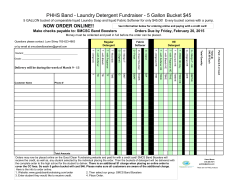


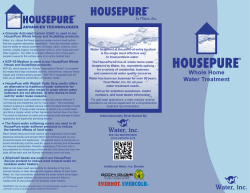

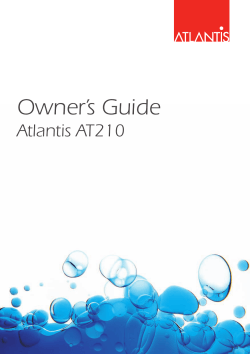
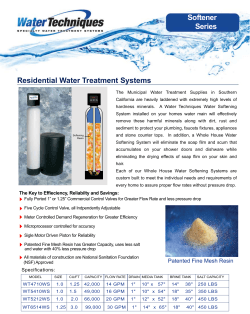

![Why soap? BON [Bio Organic & Natural]](http://cdn1.abcdocz.com/store/data/000106730_2-cde21536cdc133b31075d52c0ad2db16-250x500.png)
